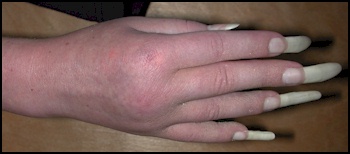Reflex Sympathetic Dystrophy (RSD)
Complex Regional Pain Syndrome I (CRPS) is the preferred name for Reflex Sympathetic Dystrophy (RSD). However, the term RSD is so ingrained that it is more familiar to the general public. RSD is a pain disorder that usually develops after an injury. The hallmark for this condition is the continuation of pain that is much greater than the severity of the initial injury.
Symptoms of RSD
RSD Symptoms usually begin in the hand or foot of the injured limb. A mild stimulus such as the point of a toothpick or brushing the skin may cause pain. The involved area may be very cold with discolored colored skin that has increased sweating. Over time there is decreased movement, weakness and changes in growth of hair and nails.
RSD Examination
The RSD examination looks for swelling, sweating in the symptomatic area. Skin color may be blue or bright red. Skin temperature is usually colder compared to the uninvolved side. Range of motion and strength is documented. There may be areas that cannot be touched as they are too painful while others can be examined but will be much more sensitive than areas not involved. Tremor may occur along with abnormal movements.
Treatment of RSD
Reflex Sympathetic Dystrophy is a pain disorder where the brain gradually becomes out of control and many different RSD treatments must be used to bring it under control. Probably the most important is to treat as early as possible once the diagnosis is suspected. The goal is to have the brain receive more normal information from the involved area. This cannot occur if the pain is constant and the brain is not getting the normal feedback from the involved area as it is not moving normally.
Besides medication, some therapies try to restore normal sensation and function. The brain essentially needs to be retrained. RSD symptoms can become chronic. With early diagnosis and treatment it is possible to lessen the lingering effects of RSD.
Contact COEN
Please
complete our Online Contact Form or call for an appointment.
|